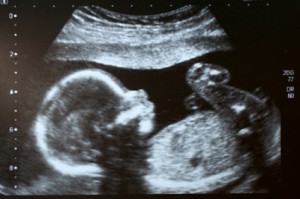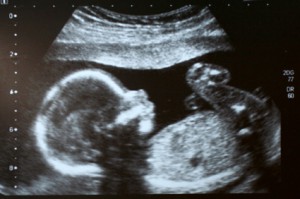The media misinformation campaign against Pennsylvania’s Women’s Right to Know Act (House Bill 1077) continues. Media outlets across the state are using new Quinnipiac University Polling data, which contains factual errors in the very questioning, to give the impression that Pennsylvania not only disapproves of informed consent before abortion but that Pennsylvanians have reversed our forty-year tradition of opposing abortion-on-demand.

The Women’s Right to Know Act provides a pregnant woman the opportunity to see an ultrasound image of her unborn child and observe the heartbeat prior to an abortion. Empowering a woman with all the facts about her pregnancy is crucial when she is facing a decision as grave and irrevocable as abortion.
Planned Parenthood admits that trans-vaginal ultrasounds are done in 99% of the early abortions at their facilities. Ultrasounds are a standard element of abortion protocol. The abortionist requires an ultrasound to determine the gestational age of the child, to verify the child has implanted in the uterus and that the woman has not already miscarried. The bill merely gives a pregnant woman the legal right to view that image. Under current law, there is no obligation for the abortionist to provide her with the image or explain to her the status of her pregnancy.
Quinnipiac polling data released Thursday shows Pennsylvanians oppose an “ultrasound mandate” by a margin of 48% to 42%. Pressing the issue further, the poll found Pennsylvanians oppose a requirement for a trans-vaginal ultrasound prior to abortion by a margin of 64% to 23%. However, the premise for these poll questions is completely inaccurate. House Bill 1077 is not an “ultrasound mandate” nor does it call for trans-vaginal ultrasounds.
 Opposing an ultrasound prior to abortion is like opposing a steering wheel when driving a car. You can’t do it without one. An abortion cannot be done without the performance of an ultrasound according to the standards of the National Abortion Federation. Planned Parenthood even concedes, “our health centers already include ultrasounds routinely as an integral part of the thorough and standard medical practices in our abortion services.”
Opposing an ultrasound prior to abortion is like opposing a steering wheel when driving a car. You can’t do it without one. An abortion cannot be done without the performance of an ultrasound according to the standards of the National Abortion Federation. Planned Parenthood even concedes, “our health centers already include ultrasounds routinely as an integral part of the thorough and standard medical practices in our abortion services.”
The questions in the poll themselves are based on a false premise, which does not accurately reflect the provisions in the bill. The media has seized on the data and heralded it as the definitive repudiation of the bill by the voters. These conclusions are more rooted in politics than fact. The Philadelphia Inquirer went as far as to assert that Republican Governor Tom Corbett’s recent drop in approval rating was partially due to House Bill 1077, despite the fact the bill has not yet come to the House floor and the governor had not taken a position on it at the time the poll was conducted.
Even with the false premise of the polling questions, which ultimately favors the pro-abortion position, men opposed ultrasounds prior to abortion by a much greater margin than women. Pennsylvania women were pretty evenly divided on the issue but it was men who gave the pro-abortion side the edge in the poll. (So much for the supposed “War on Women.”)

Beyond misrepresenting the Women’s Right to Know Act, Quinnipiac’s findings should be called into question for claiming more Pennsylvanians support abortion than oppose it. The poll found 54% of Pennsylvanians favor abortion legal in all or most circumstances. Only 37% opposed abortion in all or most circumstances. If those numbers were correct, Pennsylvania would be reversing an over forty-year tradition of opposing abortion virtually on demand.
Pennsylvania is well-known for being a pro-life haven despite its blue tendencies during presidential elections and a one million voter registration advantage for Democrats. One of Pennsylvania’s most popular governors, Bob Casey, Sr. (D) was an outspoken pro-life advocate, signing into law the nation’s most protective law for unborn children at that time, the Abortion Control Act. Casey defended the law all the way to the US Supreme Court, ultimately resulting in the Planned Parenthood vs. Casey decision. Casey became a national pro-life hero after being denied a speaking role at the 1992 Democratic National Convention over his stance on abortion.
It may not fit into the media’s narrative but the political landscape in Pennsylvania has not changed on the right to life. Nationally, Gallup polling has shown in several of the past few years more Americans self-identify as “pro-life” than “pro-choice.” It would be far-fetched to believe Pennsylvania, with such a long pro-life history, was completely bucking national trends on the issue.



 After widespread public outcry, President Obama thought he could re-brand the mandate by offering a so-called “accommodation.” However, pro-life and religious organizations saw right through it. National Right to Life reported that under the “accommodation,” certain insurers will be directly required to offer coverage of birth control methods without copayments, while forbidden to charge anything extra for this option.
After widespread public outcry, President Obama thought he could re-brand the mandate by offering a so-called “accommodation.” However, pro-life and religious organizations saw right through it. National Right to Life reported that under the “accommodation,” certain insurers will be directly required to offer coverage of birth control methods without copayments, while forbidden to charge anything extra for this option.

 “This legislation will empower women by giving them a high-tech tool that will provide them with critical information about the development of the child in the womb. House Bill 1077 represents a victory for women, and a victory for patient rights,” Gallagher added. “Before a woman makes a decision as grave as abortion, she should have the chance to see what’s really going on in her pregnancy,” said Maria Vitale Gallagher, legislative director for the Pennsylvania Pro-Life Federation.
“This legislation will empower women by giving them a high-tech tool that will provide them with critical information about the development of the child in the womb. House Bill 1077 represents a victory for women, and a victory for patient rights,” Gallagher added. “Before a woman makes a decision as grave as abortion, she should have the chance to see what’s really going on in her pregnancy,” said Maria Vitale Gallagher, legislative director for the Pennsylvania Pro-Life Federation.





